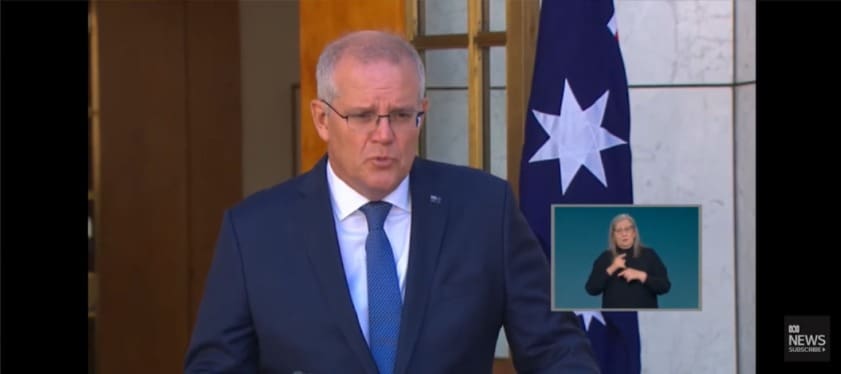
Prime Minister Scott Morrison announces coming worker isolation rules on the ABC today.
AUSTRALIA’S meat processing and food supply sector has won a national extension of concessions on COVID close contact rules that is expected to increase workforces in abattoirs and supermarkets.
The Australian Meat Industry Council has called for State and Federal Government endorsement of asymptomatic workers who are close contacts, to be able to return to work if they have no symptoms and are fully vaccinated.
Last week, the AMIC urgently called for the Federal and State Governments to protect vulnerable food supply chains across Australia, as surging Omicron cases in the community forced essential workers to stay home and businesses to temporarily close or operate at very low staffing levels.
AMIC has warned that there is a supply shortage looming unless urgent guarantees are put in place to shore up meat production and supply capacity. This included processors, boning rooms, smallgoods manufacturers, cold stores, wholesalers, etc through to butcher shops and supermarkets.
On January 4, AMIC chief executive officer Patrick Hutchinson said under current national COVID protocols, industry workers were unable to present for work for at least seven days if someone in their family or household tested positive to COVID.
“We need Federal and State Governments to prioritise the nation’s food chain production and supply, in the same way that the health care sector is continuing to operate under unprecedented pressure.
“The Australian meat industry needs assurance that it can continue to operate via access to Public Health Order exemptions for those that are asymptomatic close contacts, access to free or low-cost Rapid Antigen Tests, and prioritised PCR testing and turnarounds, so that we can keep on feeding the people,” he said.
The Victorian Liberal Nationals have also called on the State Government to remove the isolation requirement for fully vaccinated Victorians living with a COVID positive case. The changes, which mirror those recently implemented in New South Wales, Queensland and the United Kingdom, would also require an individual living with a COVID positive case to take a RAT every day for seven days and isolate if any of those tests are positive.
In answer to these calls, the Victorian Government today stated that “to ensure Victorians can continue to access essential food supplies, workers in the manufacturing, distribution or packaging of food and beverages including retail supermarket workers may be exempted from close contact isolation requirements in order to attend work from 11.59pm Wednesday 12 January, if it is necessary for continuity of operations and other options have been exhausted.”
The government said to mitigate risks, exempted workers must be asymptomatic, undertake daily Rapid Antigen Tests for five days and return a negative result prior to attending work. The exempted workers can’t enter shared break areas, and employers are asked to facilitate solo break time. In addition, face coverings must be worn, using N95/P2 respirators if possible. Both the worker and workplace must consent to the worker’s return, the Victorian Government said.

Australia’s Chief Medical Officer Professor Paul Kelly said some supermarkets are reporting absenteeism rates of up to 30pc due to COVID.
Australia’s chief medical officer Professor Paul Kelly today said some supermarkets are reporting absenteeism rates of up to 30-50 percent due to Omicron. Sheep and lamb saleyard prices have also been impacted as processors wind back production to match staff levels and in some cases close beef and mutton chains to prioritise lamb processing.
Prime Minister Scott Morrison said the Australian Health Protection Principal Committee yesterday endorsed a new set of arrangements for consideration by National Cabinet today relating to workers in critical supply chains – abattoirs, food production, processing and distribution – as well as emergency services.
“What that involves is asymptomatic close contacts being able to go to work in those sectors.”
“The next step is to take that forward into other sectors and we are especially looking at the transport sector and aviation, and in other distribution tasks – not customer-facing I should note, on the food side,” he said.
“We are very focussed on those critical supply chains and getting those workers where we need them to go.
“We are looking to maximise those who remain in the workforce and that is why these arrangements are being put in place,” Mr Morrison said.
“Anyone who is symptomatic or who has COVID, they are not going into work.”
Mr Morrison said he could not estimate how many extra workers the rule changes would enable to stay in supply chains.
“i mean that requires an absolute crystal ball.
“All I can tell you is more than would have been the case otherwise.”
Professor Kelly said there needs to be a risk-based approach to settings of isolation and quarantine. He said the new national AHPPC arrangement for workers in food and grocery supply chains is a reasonable step in relation to the increased transmissibility of the Omicron COVID variant.
“The revision that allows greater flexibility in balancing the need to reduce transmission against detrimental loss of workforce is an appropriate measure.”
Professor Kelly said under the AHPPC recommendations asymptomatic workers who test negative, even if they are close contacts, can come back to work earlier than has been the case in the past.
“I would really stress that we are not asking people who are sick to go to work.”
The new rules would apply to workers in food and grocery production, food manufacturing, logistics and distribution, including supermarket night shelf stackers, but not those facing the public.

HAVE YOUR SAY